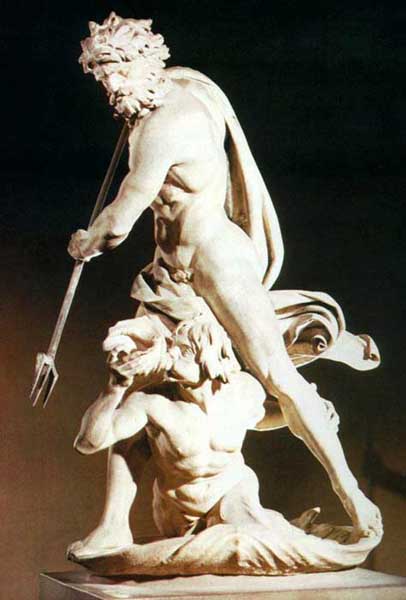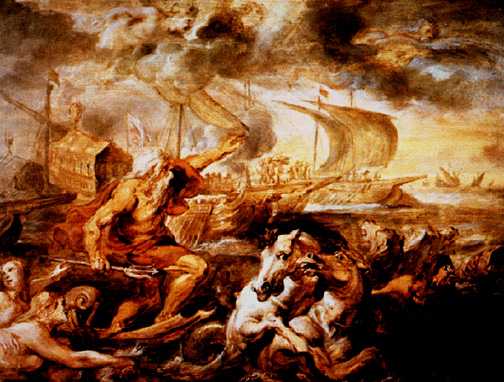



�In Greek mythology, Poseidon is one of the twelve Olympian deities of the pantheon in Greek mythology. His main domain is the ocean, and he is called the "God of the Sea". Additionally, he is referred to as "Earth-Shaker" due to his role in causing earthquakes, and has been called the "tamer of horses".
The name of the sea-god Nethuns in Etruscan was adopted in Latin for Neptune in Roman mythology; both were sea gods analogous to Poseidon. Linear B tablets show that Poseidon was venerated at Pylos and Thebes in pre-Olympian Bronze Age Greece as a chief deity, but he was integrated into the Olympian gods as the brother of Zeus and Hades.
There is a Homeric hymn to Poseidon, who was the protector of many Hellenic cities, although he lost the contest for Athens to Athena.
Tablets from Pylos record sacrificial goods destined for "the Two Queens and Poseidon" and to "the Two Queens and the King". The most obvious identification for the "Two Queens" is with Demeter and Persephone, or their precursors, goddesses who were not associated with Poseidon in later periods.
Poseidon is already identified as "Earth-Shaker" in Mycenaean Knossos, a powerful attribute where earthquakes had accompanied the collapse of the Minoan palace-culture. In the heavily sea-dependent Mycenean culture, no connection between Poseidon and the sea has yet surfaced; among the Olympians it was determined by lot that he should rule over the sea (Hesiod, Theogony 456): the god preceded his realm.
Demeter and Poseidon's names are linked in one Pylos tablet, where they appear as PO-SE-DA-WO-NE and DA-referred to by the epithets Enosichthon, Seischthon and Ennosigaios, all meaning "earth-shaker" and referring to his role in causing earthquakes. Poseidon was a major civic god of several cities: in Athens, he was second only to Athena in importance; while in Corinth and many cities of Magna Graecia he was the chief god of the polis.
According to Pausanias, Poseidon was one of the caretakers of the Oracle at Delphi before Olympian Apollo took it over. Apollo and Poseidon worked closely in many realms: in colonization, for example, Apollo provided the authorization to go out and settle from Delphi, while Poseidon watched over the colonists on their way, and provided the lustral water for the foundation-sacrifice. Xenophon's Anabasis describes a group of Spartan soldiers singing to Poseidon a paean - a kind of hymn normally sung for Apollo.
Like Dionysus and the Maenads, Poseidon also caused certain forms of mental disturbance. One Hippocratic text says that he was blamed for certain types of epilepsy.
Poseidon was a son of Cronus and Rhea. In most accounts, he is swallowed by Cronus at birth. However in some versions of the story, he, like his brother Zeus, did not share the fate of his other brother and sisters who were eaten by Cronus. He was saved by his mother Rhea, who is said to have fed a baby horse to Cronus, serving the same purpose as the rock in Zeus's case.
In some variants, Poseidon was raised by the Telchines on Rhodes, just as Zeus was raised by the Korybantes on Crete.

When the world was divided in three, Zeus received the sky, Hades the underworld and Poseidon the sea.
Given Poseidon's connection with horses as well as the sea, and the landlocked situation of the likely Indo-European homeland, some scholars have proposed that Poseidon was originally an aristocratic horse-god who was then assimilated to Near Eastern aquatic deities when the basis of the Greek livelihood shifted from the land to the sea.In any case, the early all-importance of Poseidon can still be glimpsed in Homer's Odyssey, where Poseidon rather than Zeus is the major mover of events.
In the historical period, Poseidon was often referred to by the epithets Enosichthon, Seischthon and Ennosigaios, all meaning "earth-shaker" and referring to his role in causing earthquakes.
Poseidon was a major civic god of several cities: in Athens, he was second only to Athena in importance; while in Corinth and many cities of Magna Graecia he was the chief god of the polis.
According to Pausanias, Poseidon was one of the caretakers of the Oracle at Delphi before Olympian Apollo took it over. Apollo and Poseidon worked closely in many realms: in colonization, for example, Apollo provided the authorization to go out and settle from Delphi, while Poseidon watched over the colonists on their way, and provided the lustral water for the foundation-sacrifice. Xenophon's Anabasis describes a groups of Spartan soldiers singing Poseidon a paean - a kind of hymn normally sung for Apollo.
Like Dionysus and the Maenads, Poseidon also caused certain forms of mental disturbance. One Hippocratic text says that he was blamed for certain types of epilepsy.Sailors prayed to Poseidon for a safe voyage, sometimes drowning horses as a sacrifice.
In art Poseidon's chariot was pulled by a hippocampus or seahorses. He was associated with dolphins and three-pronged fish spears (tridents). He lived in a palace on the ocean floor, made of coral and gems.
In Rome Neptune was worshipped by the Romans primarily as a horse god, Neptune Equester, patron of horse-racing. He had a temple near the race tracks in Rome (built in 25 BC), the Circus Flaminius, as well as one in the Campus Martius. Only July 23, the Neptunalia was observed at the latter temple.
Athena became the patron goddess of the city of Athens after a competition with Poseidon. They agreed that each would give the Athenians one gift and the Athenians would choose whichever gift they preferred.
Poseidon struck the ground with his trident and a spring sprung up; the water was salty and not very useful, whereas Athena offered them an olive tree.
The Athenians - or their king, Cecrops - accepted the olive tree and along with it Athena as their patron, for the olive tree brought wood, oil and food. This is thought to remember a clash between the inhabitants during Mycenaean times and newer immigrants.
It is interesting to note that Athens at its height was a significant sea power, at one point defeating the Persian fleet at Salamis Island in a sea battle. Another version of the myth says that Poseidon gave horses to Athens.
Poseidon and Apollo, having offended Zeus, were sent to serve King Laomedon. He had them build huge walls around the city and promised to reward them well, a promise he then refused to fulfill. In vengeance, before the Trojan War, Poseidon sent a sea monster to attack Troy (It was later killed by Heracles).
In the Iliad Poseidon favors the Greeks, and on several occasion takes an active part in the battle against the Trojan forces. However, in Book XX he rescues Aeneas after the Trojan prince is laid low by Achilles.
In the Odyssey, Poseidon is notable for his hatred of Odysseus due to the latter's having blinded the god's son Polyphemus. The enmity of Poseidon prevents Odysseus' return home to Ithaca for many years. Odysseus is even told, notwithstanding his ultimate safe return, that to placate the wrath of Poseidon will require one more voyage on his part.
In the Aeneid, Neptune is still resentful of the wandering Trojans, but is not as vindictive as Juno, and in Book I he rescues the Trojan fleet from the goddess's attempts to wreck it, although his primary motivation for doing this is his annoyance at Juno's having intruded into his domain.
When the world was divided in three, Zeus received the earth and sky, Hades the underworld and Poseidon the sea.
Sailors prayed to Poseidon for a safe voyage, sometimes drowning horses as a sacrifice. In his benign aspect, Poseidon created new islands and offered calm seas. When offended or ignored, he struck the ground with his trident and caused chaotic springs, earthquakes, drownings and shipwrecks.
In Greek art, Poseidon rides a chariot that was pulled by a hippocampus or by horses that could ride on the sea. He was associated with dolphins and three-pronged fish spears (tridents). He lived in a palace on the ocean floor, made of coral and gems.
In the Iliad Poseidon favors the Greeks, and on several occasion takes an active part in the battle against the Trojan forces. However, in Book XX he rescues Aeneas after the Trojan prince is laid low by Achilles.
In the Odyssey, Poseidon is notable for his hatred of Odysseus who blinded the god's son, the cyclops Polyphemus. The enmity of Poseidon prevents Odysseus's return home to Ithaca for many years. Odysseus is even told, notwithstanding his ultimate safe return, that to placate the wrath of Poseidon will require one more voyage on his part.
In the Aeneid, Neptune is still resentful of the wandering Trojans, but is not as vindictive as Juno, and in Book I he rescues the Trojan fleet from the goddess's attempts to wreck it, although his primary motivation for doing this is his annoyance at Juno's having intruded into his domain.
A hymn to Poseidon included among the Homeric Hymns is a brief invocation, a seven-line introduction that addresses the god as both "mover of the earth and barren sea, god of the deep who is also lord of Helicon and wide Aegae, and depicts his twofold nature as an Olympian: "a tamer of horses and a saviour of ships."
His consort was Amphitrite, a nymph and ancient sea-goddess, daughter of Nereus and Doris.
Poseidon was the father of many heroes. He is thought to have fathered the famed Theseus.
A mortal woman named Tyro was married to Cretheus (with whom she had one son, Aeson) but loved Enipeus, a river god. She pursued Enipeus, who refused her advances. One day, Poseidon, filled with lust for Tyro, disguised himself as Enipeus, and from their union were born the heroes Pelias and Neleus, twin boys. Poseidon also had an affair with Alope, his granddaughter through Cercyon, his son and King of Eleusis, begetting the Attic hero Hippothoon. Cercyon had his daughter buried alive but Poseidon turned her into the spring, Alope, near Eleusis.
Poseidon rescued Amymone from a lecherous satyr and then fathered a child, Nauplius, by her.
After having raped Caeneus, Poseidon fulfilled her request and changed her into a male warrior.
Not all of Poseidon's children were human. In an archaic myth, Poseidon once pursued Demeter. She spurned his advances, turning herself into a mare so that she could hide in a herd of horses; he saw through the deception and became a stallion and captured her. Their child was a horse, Arion, which was capable of human speech. Poseidon also had sexual intercourse with Medusa on the floor of a temple to Athena.
Medusa was then changed into a monster by Athena. When she was later beheaded by the hero Perseus, Chrysaor and Pegasus emerged from her neck. There is also Triton (the merman), Polyphemus (the cyclops) and, finally, Alebion and Bergion and Otos and Ephialtae (the giants). Read more